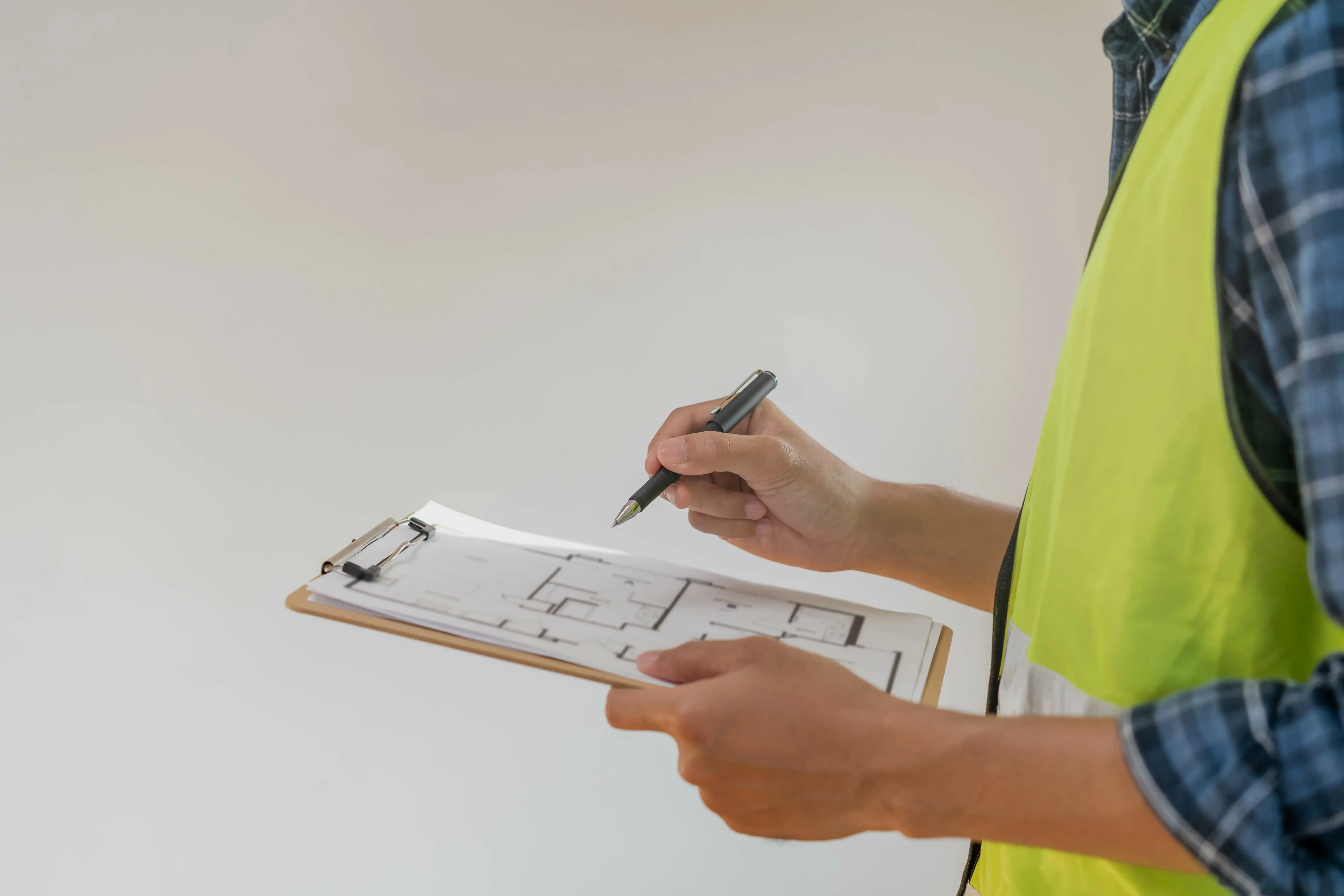A surveyor is like a GP for your home. They carry out an overall health check, identifying visible issues and potential warning signs. If something requires further investigation, they'll recommend a specialist. They won't check every detail, but they know where to look for problems.

After their inspection, a surveyor will produce a report detailing their findings. The goal is to give buyers a clear picture of the property’s condition, helping them decide whether or not it’s worth the asking price.
Although not a legal requirement, we strongly recommend hiring a surveyor, as doing so can uncover hidden issues, help you budget for repairs, and even strengthen your position when negotiating the purchase price.
In this guide, we’ll cover what surveyors do, what they check, when you need one, how much it costs, and how to choose the right type for your property.
Why Hire a Surveyor When Buying a House?
Though sellers must disclose known issues, hidden problems, like damp and boundary disputes, are easy to miss. A survey will pick up on these early so you can budget for repairs or renegotiate the offer before it’s too late.
The sooner you book a survey, the more time you’ll have to review the report and determine what you want to do. This can speed up the process and even reduce conveyancing costs.
Buying a property is one of the biggest financial decisions you’ll ever make. A survey gives you confidence, helps you avoid expensive surprises, and gives you more control during negotiations.

Compare Property Surveyors
Save on your surveying fees
Used by over 1.5 million movers in the UK
What Does a Surveyor Check in a Property?
Surveyors inspect the interior and exterior of the property as well as the land that falls within its purview. The amount of detail in the report varies depending on the type of survey you receive, but the areas of inspection are similar.
Following the inspection, they’ll publish any findings in their report, with the most common issues being asbestos, structural movement, and Japanese knotweed.
Here is what your surveyor will check:
Loft space
Fixtures and fittings
Building timbers or structural wood
Boundary walls and shared common areas
Flooring
Permanent outdoor buildings
Roof
Windows and doors
Insulation
Utilities and facilities
What Doesn’t a Surveyor Do?
Surveyors won’t inspect everything. They only do a visual inspection and won’t lift floorboards, move furniture, or look behind walls. For example, in a Level 2 Survey they won’t look under carpets or access sealed roof spaces. In a Level 3 Survey, they may look at more difficult areas, but only if it’s safe and reasonable to do so.
They won’t test electrics, plumbing or heating and won’t provide repair quotes or valuations unless agreed. If they see signs of a major problem, like asbestos, subsidence or damp, they’ll recommend bringing in a specialist to do a more detailed investigation.
Types of Property Survey (and When You Need One)
The right type of property survey depends on the property’s age, condition, and whether it’s a new build. Here’s a breakdown of the most common types and when you might need each:

RICS Level 2 Home Survey
Best For: Modern homes in reasonable condition
The RICS Level 2 Home Survey is an intermediate survey that was previously known as the HomeBuyers Report. Your surveyor will inspect the interior and exterior of the property and report on any defects found but will not delve into extensive details.

RICS Level 3 Home Survey
Best for: Older properties, large homes, or properties in poor condition
The RICS Level 3 Home Survey, formerly known as a Building Survey, is the most detailed survey available. Your surveyor will inspect the interior and exterior of the property, including areas that are difficult to access. They will then produce a report with detailed feedback that delves into any issues and defects.

Snagging Survey
Best for: New builds
Snagging Surveys have been designed for new build properties. Once completed, your snagging surveyor will inspect the interior and exterior of the property. They will review the blueprints and materials used in construction to check that the property adheres to standards and regulations.

Compare Property Surveyors
Save on your surveying fees
Used by over 1.5 million movers in the UK
How Much Does a Survey Cost?
House surveys cost between £380 and £630 on average. Prices vary depending on the property size, location, and survey type.
Here are the average costs for the most popular surveys:
| Survey Type | Average Cost |
|---|---|
| RICS Level 2 Survey | £445 |
| RICS Level 3 Survey | £629 |
| Snagging Survey | £377 |
Read more on How Much Does a House Survey Cost in the UK?
Property vs Land Surveyors
Property and land surveyors can assess a property’s condition, but land surveyors can also identify boundary lines and subdivisions. The costs of each vary depending on the property in question, but due to the complexity of land survey cases, these costs tend to be higher in comparison.
A land surveyor is needed for buyers wanting to establish their property boundary lines, so they know what is included with the transaction, such as outbuildings or right-of-ways.
In most cases, a property surveyor is suitable for buyers as the boundaries have already been established and agreed in advance.

Compare Property Surveyors
Save on your surveying fees
Used by over 1.5 million movers in the UK
How to Choose the Right Surveyor
Compare My Move can match you with up to 6 surveyors in your local area. Fill out our surveying comparison form to compare quotes and save up to 70% on your surveying fees. You’ll have the opportunity to discuss your case with each match, allowing you to make the most informed choice.
Before joining our partner network, companies must pass a strict verification process. Surveyors must be accredited by RICS as part of this process.
*Based on the average service costs for Compare My Move users. See how our data works.
FAQs
What are the Red Flags on a Survey?
Serious concerns revealed in the survey are known as red flags. These include structural issues such as subsidence and unapproved extensions.
Read more on What are Red Flags on House Survey?
Does a Surveyor Check the Loft?
The Level 2 and 3 Surveys include a loft inspection, but there is a more thorough inspection and detailed report with the Level 3.

